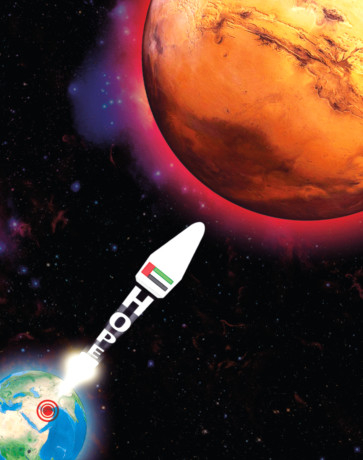
Around the globe, people are coming to realise that humanity’s reach into space needs a clear goal, and that goal should be humans to Mars. Because it once had oceans, rivers and lakes, Mars is the Rosetta Stone for telling us the truth about the potential prevalence and diversity of life in the universe.
We now know that most stars have planets, including billions that orbit in the habitable zone where temperatures are right for life. So if the theory is correct that life emerges naturally wherever the appropriate physical conditions exist, then life should be everywhere.
Since the whole history of life on Earth is one of development from simple forms to more complex forms, with ever greater capabilities for activity, intelligence, and more rapid evolution, if life is everywhere, it means intelligence is nearly everywhere. It means we are not alone.
But does life evolve wherever it can? How can we know if the appearance of life on Earth was a sure bet, or a one a trillion event? We can find out by going to Mars. If life ever appeared there, we will know that the birth of life on Earth was not a matter of freak chance.
If we find any fossils left over from the planet’s warm past on its surface, that would prove the case that life is plentiful. Not only that; if we can drill down to reach Mars’ underground water, we might find microbial survivors of the Martian biosphere.
Examining them could tell us what the possibilities are for other types of life elsewhere in the universe.
Beyond that, the same material environment that could have supported the birth of life on Mars in the past could also support the development of new branches of human civilisation there in the future. The habitability of an environment is determined by a species ability to make use of it.
If we can go to Mars, and learn how to create resources out of Martian materials, then Mars will become a habitable planet for humanity.
This is the prospect before us. For our generation and those which will follow, Mars is the new world, a new frontier that could open the way to an open future for humanity as a multi-planet spacefaring species.
So the push is on, and dozens of robotic scouting missions being launched by the US, Russia, the European Union, Japan and India have returned bounties of data to prepare the way for human explorers who could reach the Red Planet late in the next decade.
A bold move
But now there is a new entry into the Mars explorers club: the UAE is building an orbiter called Hope, which will be launched in a few years.
It’s a bold move. All the other players in the Mars game are powerful nations or confederations with populations of hundreds of millions of people, and vast and diverse economies. Many countries much larger than the UAE have declined the challenge to enter the sport. But the UAE is stepping up to the plate.
Does this make sense? Yes, it does. In fact, it’s a brilliant move. Youth love adventure.
The world’s escalating Mars exploration effort is the great adventure of our time. It’s thus the challenge that will call out to the young people of every nation that participate: “Learn your science and you can be a pioneer of new worlds.”
Out of that challenge will come millions of young scientists, engineers, inventors, doctors, technological entrepreneurs — the kind of people that drive society forward.
The Apollo programme doubled the number of science graduates in the US at every level, producing a return of intellectual capital that continues to benefit America to this day. The Mars programme will do the same for the UAE, and everyone else who joins.
Not only that, there is another issue: Self-definition. First class nations do first class things. By joining the Mars club, the UAE is defining itself to be as good as the best anywhere. That counts for a lot.
So how about it, Australia? The UAE is a space exploring nation. Why aren’t you? And how about the rest of you?
What’s your excuse? Do you really want to tell your brightest and boldest young people that if they want to explore new worlds, they should emigrate? Think about it.
Congratulations UAE, you’ve made the right choice. Welcome aboard.
Robert Zubrin is president of Pioneer Astronautics and the Mars Society and the author of The Case for Mars: The Plan to Settle the Red Planet and Why We Must. He spoke at the recent Aspen Abu Dhabi Ideas Forum.












